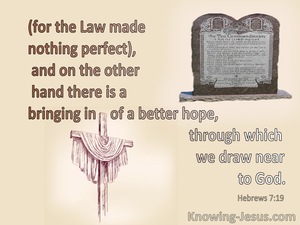Parallel Verses
Daniel Mace New Testament
for the law made no man perfect, but this was effected by introducing a better hope, which brings us nearer to the divine presence.
New American Standard Bible
(for
King James Version
For the law made nothing perfect, but the bringing in of a better hope did; by the which we draw nigh unto God.
Holman Bible
(for the law perfected
International Standard Version
since the Law made nothing perfect, and a better hope is presented, by which we approach God.
A Conservative Version
(for the law made nothing fully perfect), and an introduction of a better hope, through which we approach God.
American Standard Version
(for the law made nothing perfect), and a bringing in thereupon of a better hope, through which we draw nigh unto God.
Amplified
(for the Law never made anything perfect); while on the other hand a better hope is introduced through which we now continually draw near to God.
An Understandable Version
(since the law did not make anything [i.e., anyone] perfect), but on the other hand, there is the introduction of a better hope [which did bring perfection through Christ], by which we draw near to God.
Anderson New Testament
(for the law made no perfect expiation), and the introduction of a better hope, by which we draw near to God.
Bible in Basic English
(Because the law made nothing complete), and in its place there is a better hope, through which we come near to God.
Common New Testament
(for the law made nothing perfect); and on the other hand, a better hope is introduced, through which we draw near to God.
Darby Translation
(for the law perfected nothing,) and the introduction of a better hope by which we draw nigh to God.
Godbey New Testament
for the law made nothing perfect, but the bringing in of a better hope, by which we draw nigh unto God.
Goodspeed New Testament
(for there was nothing final about the Law), and a better hope begins to dawn, through which we may approach God.
John Wesley New Testament
For the law made nothing perfect, but the bringing in of a better hope did, by which we draw nigh to God.
Julia Smith Translation
(For the law completed nothing,) but the bringing in of a better hope; by which we draw near to God.
King James 2000
For the law made nothing perfect, but the bringing in of a better hope did; by which we draw near unto God.
Lexham Expanded Bible
(for the law [made] nothing perfect), but on the other hand [there is] the introduction of a better hope through which we draw near to God.
Modern King James verseion
For the Law made nothing perfect, but the bringing in of a better hope did, by which we draw near to God.
Modern Spelling Tyndale-Coverdale
For the law made no thing perfect: but was an introduction of a better hope, by which hope, we draw nigh unto God.
Moffatt New Testament
(for the Law made nothing perfect), and there is introduced a better Hope, by means of which we can draw near to God.
Montgomery New Testament
(for the Law brought nothing to perfection); and there is the bringing in of a better hope by which we draw near to God;
NET Bible
for the law made nothing perfect. On the other hand a better hope is introduced, through which we draw near to God.
New Heart English Bible
(for the law made nothing perfect), and a bringing in of a better hope, through which we draw near to God.
Noyes New Testament
for the Law perfected nothing,and on the other, the bringing in of a better hope, by which we draw near to God.
Sawyer New Testament
for the law made nothing perfect, but was the introduction of a better hope through which we draw nigh to God.
The Emphasized Bible
For, the law, perfected, nothing; but there is the superinducing of a better hope, - through which we draw near unto God.
Thomas Haweis New Testament
For the law led to no perfection, but was an introduction to a better hope, by which we draw nigh unto God.
Twentieth Century New Testament
(for the Law never brought anything to perfection); and, on the other hand, we have the introduction of a better hope, which enables us to draw near to God.
Webster
For the law made nothing perfect, but the introduction of a better hope did; by which we draw nigh to God.
Weymouth New Testament
for the Law brought no perfect blessing--but on the other hand we have the bringing in of a new and better hope by means of which we draw near to God.
Williams New Testament
for the law had never made anything perfect -- and so a better hope is brought to us, through which we have approach to God.
World English Bible
(for the law made nothing perfect), and a bringing in of a better hope, through which we draw near to God.
Worrell New Testament
(for the law perfected nothing), and a bringing in of a better hope, through which we draw near to God.
Worsley New Testament
for the law made nothing perfect, but the introducing of a better hope did, by which we draw near to God.
Youngs Literal Translation
(for nothing did the law perfect) and the bringing in of a better hope, through which we draw nigh to God.
Themes
Better » The keyword of Hebrews » Better hope
new Dispensation » General references to
Draw near to God » In prayer and fellowship
God » Christ as » Draw near to, in prayer and fellowship
Hope » A better hope brought in by Christ
Law » Bondage of » Insufficient
Melchizedek » A priest and type of Christ
Nearness to God » In prayer and fellowship
New » Creature dispensation » Superiority of the new dispensation over the old))
New » The keyword of Hebrews » Better hope
Priest » Before moses » Melchizedek
Topics
Interlinear
Oudeis
Teleioo
De
References
Morish
Word Count of 37 Translations in Hebrews 7:19
Prayers for Hebrews 7:19
Verse Info
Context Readings
Another Priest, Like Melchizedek
18 wherefore the preceeding law is abolished for its being weak and useless. 19 for the law made no man perfect, but this was effected by introducing a better hope, which brings us nearer to the divine presence. 20 Besides those priests were establish'd without any oath: but this with an oath,
Cross References
Acts 13:39
by him, every one who believes, is purged from all that guilt, for which the law of Moses had made no such provision.
Hebrews 4:16
us therefore approach with confidence to the throne of grace, that we may obtain the seasonable assistance of divine mercy and favour.
Hebrews 9:9
This type subsists to the present time, both gifts and sacrifices being still offered, which cannot purify the mind of him that officiates
Romans 8:3
God having sent his own son invested with a body like that of sinful men, as a sacrifice for sin, thereby destroyed its power; which the law could not effect, human nature being in such a corrupted state.
Galatians 2:16
yet knowing that a man is not justified by the works of the law, but by faith in Jesus Christ, even we have believed in Christ Jesus, that we might be justified by faith in him, and not by the works of the law, by which there is no justification.
Hebrews 6:18
that by two immutable things in which it was impossible for God to deceive us, we, who have no other refuge to fly to, but to maintain our present hopes,
Hebrews 10:1
For the law being only an allusion to a future dispensation that was more excellent, and not an exact imitation of such a state, cannot by the anniversary sacrifices, which are offered, entirely purify those that present themselves.
John 1:17
the law indeed was delivered by Moses, but grace and truth was the dispensation of Jesus Christ.
John 14:6
Jesus said to him, I am the way, and the truth, and the life: no man can come to the father, but by me.
Romans 3:20-21
for by the observation of the law no one shall be justified in his sight, since it is the law that takes cognizance of sin.
Romans 5:2
who has given us access by faith to that degree of favour, we are in, by which we triumph in the hopes of divine glory.
Galatians 3:24
so that the law was our school-master to bring us to Christ, that we might be justified by faith.
Ephesians 2:13-18
but now you who were formerly at a distance, are brought near by the death of Christ Jesus.
Ephesians 3:12
by whom we have freedom of access to God, with confidence, by faith in him.
Colossians 1:27
to whom God does disclose the glorious advantages of this mystery to you Gentiles, to wit, "that by Christ you may have the expectation of glory."
1 Timothy 1:1
Paul an apostle of Jesus Christ by the appointment of God our saviour, and of Jesus Christ our hope,
Hebrews 7:11
If therefore the Levitical priesthood, concerning which the people received a law, could have given perfection, what further need was there that another priest should rise, to be named after the order of Melchisedec, and not after the order of Aaron?
Hebrews 7:25
so that he has an uninterrupted power to save those, that come to God by him, because he ever lives to make intercession for them.
Hebrews 8:6
Our high priest then has obtained a priesthood so much the more excellent, as he is the mediator of a better alliance, established upon better promises.
Hebrews 10:19-22
Wherefore, my brethren, since by virtue of the blood of Jesus we have the liberty of entring into the holy of holies,
Hebrews 11:40
because God out of his distinguishing kindness to us, would not let them arrive before us to the enjoyment of perfect felicity.



